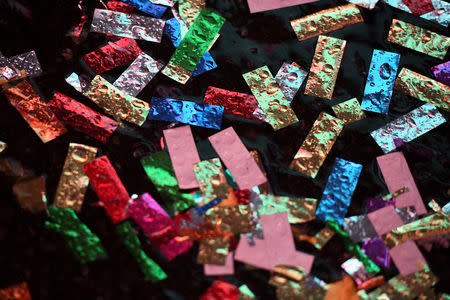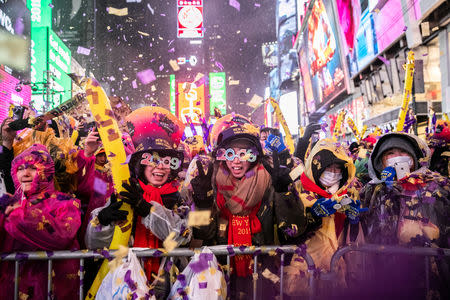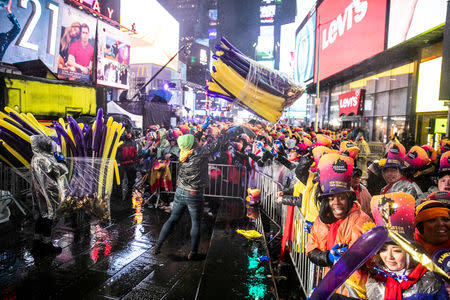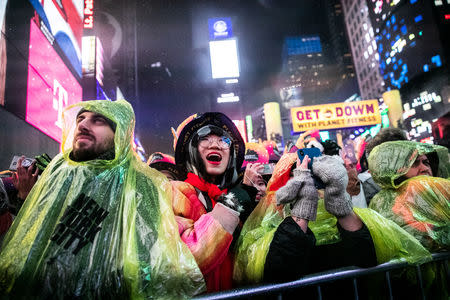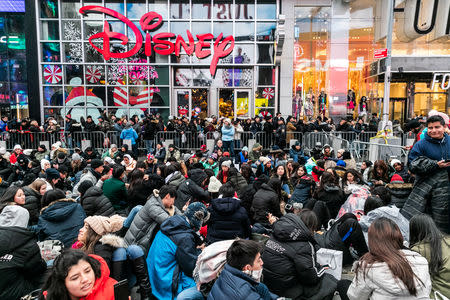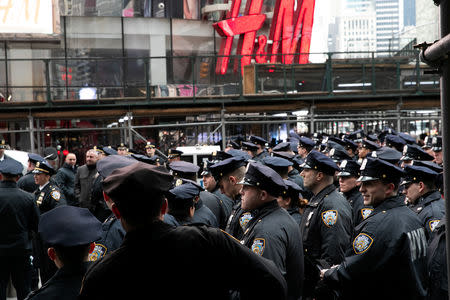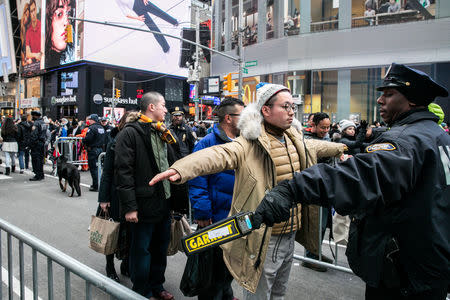Thousands brave rain in New York's Times Square to welcome 2019
By Gabriella Borter and Jonathan Allen
NEW YORK (Reuters) - New York's Times Square erupted with fireworks and cheers at the stroke of midnight on Tuesday as thousands of hardy merrymakers braved pouring rain and watched the glowing New Year's Eve ball complete its midnight descent to mark the start of 2019.
For the multitudes who gathered in the famed midtown Manhattan crossroads, the thrilling moment was reward for enduring hours of standing in a steady downpour during the waning hours of 2018.
Helping to keep spirits high was a slate of performers including Christina Aguilera, New Kids on the Block and Sting who entertained the resilient crowd. Many donned plastic rain ponchos and sported colorful, oversized top hats handed out by organizers.
"It was a bucket-list thing," said Daniela Ramous, a 34-year-old sales manager from McAllen, Texas. "You grow up watching it on TV, you see all the excitement. There's something magical about New York during this time of year."
Injecting a somber note into the festivities, the Times Square Alliance, the business association that organizes the event, paid a special tribute to freedom of the press, after a year in which journalists came under attack around the world, including in the United States.
A minute before midnight, an invited group of journalists from ABC News, NBC News, the Washington Post, Reuters and other outlets joined Mayor Bill de Blasio in pushing the button that initiates the glittering ball's drop.
Visitors had begun gathering inside penned-off enclosures in the morning, starting an hours-long marathon of standing in one place, with no access to public restrooms.
Belying the idea that New Yorkers themselves eschew the Times Square festivities, Eskie Garcia, a 59-year-old city worker living in Brooklyn, said she has come every year for about a decade.
"You have to come here in person," she said before applying lipstick and asking a stranger to take her picture on her cellphone. "Especially when you live by yourself. You come, you meet people."
DANCING IN THE RAIN
Janette Masson, 29, said she preferred this year's rain to last year's bone-chilling cold. Masson, who works in retail in Boston, had been in her pen since 9.30 a.m., eating granola bars for lunch and dinner.
"I can deal with it," said Masson's 61-year-old mother, Judy Masson, as she stood in the rain with many hours of waiting still to come. "You make the best of a bad thing."
Umbrellas were banned as part of the tight security plan, reflecting concern over the possibility of random attacks. Plastic ponchos were allowed, with street vendors selling them for $5 on nearby avenues.
The Werline family from San Antonio, Texas, parlayed a connection with a friend who works at the Hard Rock Cafe into a coveted dry spot. Even though they did not have tickets for the private party inside, they had been permitted to stand under the attraction's deep awning.
"Thank God we know someone," Tammy Werline, 49, said as rain cascaded off the awning's edge and people in suits and cocktail dresses buzzed in and out of the restaurant, almost directly below the glowing ball.
The tradition of watching a giant ball drop from a pole on top of the narrow building at the head of Times Square in midtown Manhattan began in 1907.
The ball in current use - a glittering, LED-studded sphere made by Waterford Crystal and Philips Lighting - made its debut in 2008. Weighing 11,875 pounds (5,386 kg) and measuring 12 feet (3.7 meters) in diameter, it sits year-round on the roof of One Times Square, the one-time headquarters of the New York Times.
SHARPSHOOTERS AND DETECTORS
As in years past, the New York Police Department screened people entering the corrals, deployed sharpshooters on rooftops and used radiation detectors throughout the event.
It also had planned to use an aerial drone for the first time to monitor the crowds, but canceled the effort on Monday evening given the wind and rain.
The organizers chose to honor press freedom and the contribution of journalists partly because of the deadly hostility that some reporters have faced this year.
Jamal Khashoggi, a Saudi columnist for the Washington Post and U.S. resident, was killed inside a Saudi Arabian consulate in Turkey. In June, a gunman shot dead five employees of The Capital, a newspaper in Annapolis, Maryland.
This month also marked the first anniversary of the imprisonment in Myanmar of Reuters reporters Wa Lone and Kyaw Soe Oo for investigating how the country's security forces killed members of its Muslim Rohingya minority.
(Reporting by Jonathan Allen; Additional reporting by Gabriella Borter; Writing by Frank McGurty; Editing by Kim Coghill)
